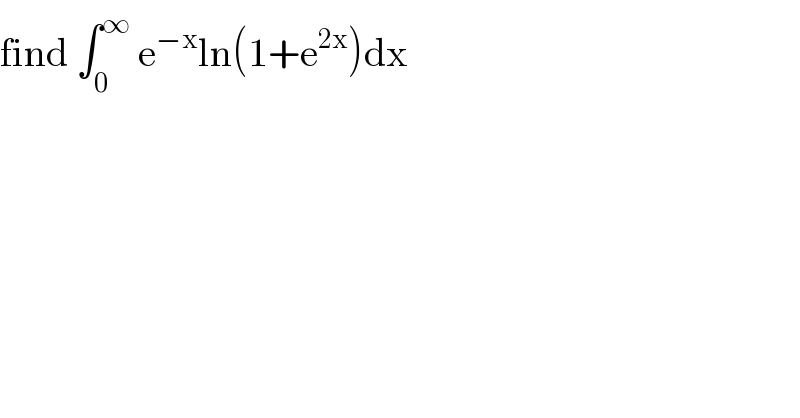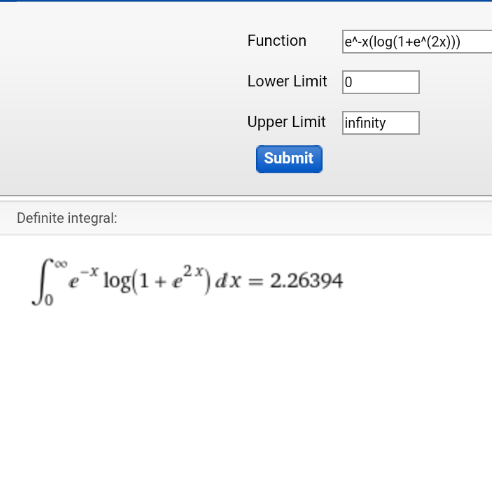
Question and Answers Forum
Question Number 123676 by mathmax by abdo last updated on 27/Nov/20

Answered by mnjuly1970 last updated on 27/Nov/20
![solution Ω=∫_0 ^( ∞) e^(−x) ln[e^(2x) (1+e^(−2x) )]dx =2∫_0 ^( ∞) xe^(−x) dx+∫_0 ^( ∞) e^(−x) ln(1+e^(−2x) )dx =2Γ(2)+∫_0 ^( ∞) e^(−x) Σ_(n=1 ) ^∞ (((−1)^(n−1) e^(−2nx) )/n)dx =2+Σ_(n=1) ^∞ (((−1)^(n−1) )/n)∫_0 ^( ∞) e^(−x(2n+1)) dx =2+Σ_(n=1) ^∞ (((−1)^n )/n)[(e^(−x(2n+1)) /(2n+1))]_0 ^∞ =2+Σ_(n=1 ) ^∞ (((−1)^(n−1) )/(n(2n+1)))=2−[Σ_(n=1 ) ^∞ (((−1)^n )/n)−((2(−1)^n )/(2n+1))] =2+ln(2)+2[−1+(π/4)] ln(2)+(π/2) ≈2.26](Q123682.png)
Commented by mnjuly1970 last updated on 27/Nov/20

Commented by harckinwunmy last updated on 27/Nov/20

Commented by Dwaipayan Shikari last updated on 27/Nov/20

Commented by Dwaipayan Shikari last updated on 27/Nov/20
https://wolframalpha.com/
Commented by mnjuly1970 last updated on 27/Nov/20

Commented by Dwaipayan Shikari last updated on 27/Nov/20
��
Commented by mathmax by abdo last updated on 28/Nov/20

Answered by mathmax by abdo last updated on 28/Nov/20
![I=∫_0 ^∞ e^(−x) ln(1+e^(2x) )dx changement e^x =t give I =∫_1 ^∞ t^(−1) ln(1+t^2 )(dt/t) =∫_1 ^∞ ((ln(1+t^2 ))/t^2 )dt =_(bypsrts) [−(1/t)ln(1+t^2 )]_1 ^∞ +∫_1 ^∞ (1/t)×((2t)/(1+t^2 ))dt =ln(2) +2∫_1 ^∞ (dt/(1+t^2 )) =ln(2)+2[arctant]_1 ^∞ =ln(2)+2{(π/2)−(π/4)} =ln(2)+2((π/4)) =(π/2) +ln(2)](Q123757.png)
